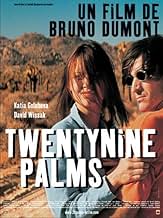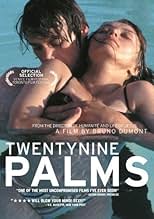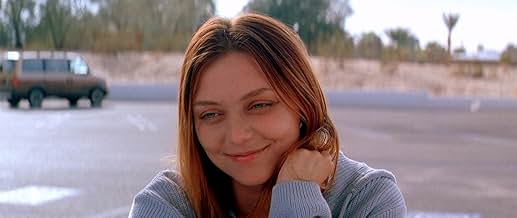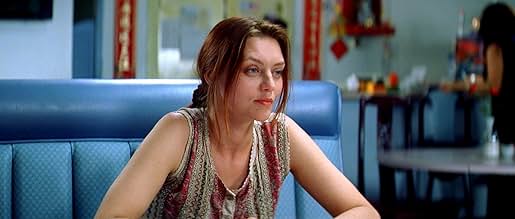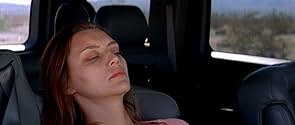IMDb RATING
5.1/10
5.3K
YOUR RATING
David, an American photographer, and his Russian girlfriend Katia are scouting locations for a photo shoot. During the day, they drive through some of the wildest, most bizarre desert landsc... Read allDavid, an American photographer, and his Russian girlfriend Katia are scouting locations for a photo shoot. During the day, they drive through some of the wildest, most bizarre desert landscapes, but their luck begins to run out.David, an American photographer, and his Russian girlfriend Katia are scouting locations for a photo shoot. During the day, they drive through some of the wildest, most bizarre desert landscapes, but their luck begins to run out.
- Director
- Writer
- Stars
- Awards
- 1 win & 2 nominations total
Yekaterina Golubeva
- Katia
- (as Katia Golubeva)
- Director
- Writer
- All cast & crew
- Production, box office & more at IMDbPro
Featured reviews
Well this one definitely isn't for everyone, as you can tell by the comments. For awhile, I liked this movie. I kind of liked these two driving around in the desert. The movie had that sort of dreamlike Zabriskie Point thing going on. In fact, along those lines, I'd mention that the film did feel like something from the 1960s (in a good way).
Katia Golubeva is a pretty enough girl, and we see a lot of her.
I know from regular trips to Death Valley that Europeans have a special respect for American deserts. At Badwater Junction in Death Valley, you can walk out onto the salty flats and despite the fact that you're in a giant valley, they know enough to whisper, or remain silent altogether. It's a pensive respect for the desert I wish more Americans had.
Here, you get a lot of California desert; always a good thing (to me). I liked these two characters when they were getting along - there was a weird and charming sort of innocence in their sex life and affection for each other.
Didn't fully get why they were constantly sniping at one another or why they kept having falling outs with each other. And that seems to be important to the overall point of the film, and I'm still thinking about it. I wanted to slap them - especially David - when he was being a jerk.
Because you should *never* take a sexually liberated French girl naked in the desert for granted that way (Am I right?).
The end is jarring, and a metaphor for something but I'm not sure what, exactly. Something, I suspect, about the fact that the two characters should have been a little more tender and appreciated each other more (especially on the dude's part), what with all the meanness and cruelty in the world (and so on).
This is not for everyone. It is slow moving, beautiful to look at, with characters who occasionally charm and occasionally irritate. The end sequence is disturbing and unpleasant.
If you're a fan of mainstream Hollywood, you might find this excruciatingly boring. The pervasive quiet of the movie makes the end all the more startling.
This film was not an unqualified success, but there's a fair amount to like here, I think. For certain people, anyway.
Katia Golubeva is a pretty enough girl, and we see a lot of her.
I know from regular trips to Death Valley that Europeans have a special respect for American deserts. At Badwater Junction in Death Valley, you can walk out onto the salty flats and despite the fact that you're in a giant valley, they know enough to whisper, or remain silent altogether. It's a pensive respect for the desert I wish more Americans had.
Here, you get a lot of California desert; always a good thing (to me). I liked these two characters when they were getting along - there was a weird and charming sort of innocence in their sex life and affection for each other.
Didn't fully get why they were constantly sniping at one another or why they kept having falling outs with each other. And that seems to be important to the overall point of the film, and I'm still thinking about it. I wanted to slap them - especially David - when he was being a jerk.
Because you should *never* take a sexually liberated French girl naked in the desert for granted that way (Am I right?).
The end is jarring, and a metaphor for something but I'm not sure what, exactly. Something, I suspect, about the fact that the two characters should have been a little more tender and appreciated each other more (especially on the dude's part), what with all the meanness and cruelty in the world (and so on).
This is not for everyone. It is slow moving, beautiful to look at, with characters who occasionally charm and occasionally irritate. The end sequence is disturbing and unpleasant.
If you're a fan of mainstream Hollywood, you might find this excruciatingly boring. The pervasive quiet of the movie makes the end all the more startling.
This film was not an unqualified success, but there's a fair amount to like here, I think. For certain people, anyway.
This is one of those films where "nothing happens", where the frame stands as a window into the world of tedium. It's contrasted against this humming nothingness, mirrored in the film in the empty stretches of desert, that the small gestures can reverberate outwards to the eternal, to give us a portrait of life as we might know it by our own existence, elsewhere, in some other time.
These fleeting human moments, painful or exhilarating in their small profundity, largely make the film for me. A man stealing a glance at a passing girl in a diner, glance which may or may not be casual or mean something else, and which makes the woman sulk in jealous consternation. The woman trying to penetrate the hard, unyielding, demeanor of the man, asking him as he drives what is he thinking, the man saying nothing. The irritable tantrum of the man when their car won't go any further in a dirt road, that reveals the male child inside, petulant and impotent at the sight of failure.
Elsewhere Dumont fails to cut as incisively. The contrast he gives us in the first pool scene, "do you love me?", "do you like my penis?", is simpleminded at best.
The film works despite all that, first as a tangible reminder of the meaninglessnes of craving, here in the form of carnal animal sex that needs to be consumated, almost exorcised, the moment it builds. The nothingness of Dumont's desert world is not the shunyata of the Buddhists though, a realization of the world in true form. Rather it's a limbo where souls in disconnect aimlessly drag their feet yearning for a sense of direction or purpose when the only sense possible is a sense of still time. This shines for me in the latenight scene where David finds Katia sitting by herself at the side of the macadam, they seem like they're washed ashore in some other plain of existence. A pall of simmering, unspeakable, violence hangs over this like the shifting rents of dust in a dirt road, so that at least a breaking point can be surmised to be waiting at the other end.
Then it works for me as a painful vehicle that brings us at the brink of the existential void. I'm not very enamored of the act of random cruelty that makes this possible, the randomness makes sense yet at the same time it's so easy as to be schematic, but the monster that emerges on the other end is a shocking sight to me because I have the memory of the flawed human being that used to be.
The dysfunction of the protagonists then, foremostly human, also foreshadows doom. That malaise we see but small traces of in their behavior must exist out there too, in the rest of the world that is largely kept from our eyes.
Dumont doesn't dare go any further than this, that is if we accept there is somewhere to go, but as an agnostic lament it goes far enough.
These fleeting human moments, painful or exhilarating in their small profundity, largely make the film for me. A man stealing a glance at a passing girl in a diner, glance which may or may not be casual or mean something else, and which makes the woman sulk in jealous consternation. The woman trying to penetrate the hard, unyielding, demeanor of the man, asking him as he drives what is he thinking, the man saying nothing. The irritable tantrum of the man when their car won't go any further in a dirt road, that reveals the male child inside, petulant and impotent at the sight of failure.
Elsewhere Dumont fails to cut as incisively. The contrast he gives us in the first pool scene, "do you love me?", "do you like my penis?", is simpleminded at best.
The film works despite all that, first as a tangible reminder of the meaninglessnes of craving, here in the form of carnal animal sex that needs to be consumated, almost exorcised, the moment it builds. The nothingness of Dumont's desert world is not the shunyata of the Buddhists though, a realization of the world in true form. Rather it's a limbo where souls in disconnect aimlessly drag their feet yearning for a sense of direction or purpose when the only sense possible is a sense of still time. This shines for me in the latenight scene where David finds Katia sitting by herself at the side of the macadam, they seem like they're washed ashore in some other plain of existence. A pall of simmering, unspeakable, violence hangs over this like the shifting rents of dust in a dirt road, so that at least a breaking point can be surmised to be waiting at the other end.
Then it works for me as a painful vehicle that brings us at the brink of the existential void. I'm not very enamored of the act of random cruelty that makes this possible, the randomness makes sense yet at the same time it's so easy as to be schematic, but the monster that emerges on the other end is a shocking sight to me because I have the memory of the flawed human being that used to be.
The dysfunction of the protagonists then, foremostly human, also foreshadows doom. That malaise we see but small traces of in their behavior must exist out there too, in the rest of the world that is largely kept from our eyes.
Dumont doesn't dare go any further than this, that is if we accept there is somewhere to go, but as an agnostic lament it goes far enough.
This film is perhaps one of the most disconcerting and original film to discuss the potential for dislocation and horror that lies in all male-female sexual relationships. In the manner of one of the best modernist road movies (Two Lane Black Top), it strips all the unnecessary and hackneyed elements of narrative (e.g. standard horror or romance "tropes" often employed in the couple road movie) and both transcends the level of most other films, and simultaneously creates a far more convincing and natural reality through its controlled pacing, lack of narrative contrivance, its central performances and its perfectly composed photography.
As usual, Dumont's psycho-philosophical concerns are the ultimate "point" of the film, and it is essential that these are at least partially understood in order to appreciate the film. Some of these, once again, are notions (I believe) about the essentially selfish, violent "animal" nature of the way most humans think, particularly men, and the way this explains the insatiable human appetite to murder and screw. The final link that is made between horrific random brutality and the central man's sexuality is thereby horribly significant, and in no way simply an attempt to shock an audience simply for the sake of shocking an audience. A shock is of course intended, but to make an interesting point that challenges a complacently liberal optimist view of human nature/behaviour. It also provides a perfectly significant and unpleasant climax to Dumont's uneasy journey into the amorality and horror of male-female relations and human behaviour.
It's disheartening and yet inevitable that this film is not generally recognised as a brilliant piece of work. Whereas Bresson is now recognised as a master, Dumont is a new master and many of the comments here reflect the fact that his work has been predictably misunderstood. Many people display an obvious and almost deliberate confusion at his method and his choices, not being prepared to do any work to engage with the film or to accept that these are indeed artistically valid choices/ a method. Instead of seeing the its originality as refreshing, they are simply irritated by any the fact that it doesn't play the expected "game" to make it another easily-consumed-and-forgot piece of cinema, or a superficial piece of shock/extreme cinema like Noe's overpraised homage to 70s exploitation cinema with added French pretentiousness. Blinkered by their limitations, they can only judge it as a failure because it fails to fulfill their expectations and does not conform to what what they "know" or imagine to be good in film - a fulsome if rather predictable narrative packed with event, lots of theatrical, snappy dialogue (e.g. Noe's ludicrous racist dialogue that strikes me completely over-the-top and or his character's stale cod-philos. speeches) that is actually horribly predictable and rather dull, "good" acting (i.e. emotional, though unrealistic performances which encourage either empathy or hatred for the character, acted with theatrical charisma or self-conscious villainy, such as Noe's rapist). But then, as Dumont realises, most people are not capable of using cinema for doing anything more than indulging their appetite for sex, food and violence... and this is is what most cinema provides a simulated escape into, without the risk of getting caught.
As usual, Dumont's psycho-philosophical concerns are the ultimate "point" of the film, and it is essential that these are at least partially understood in order to appreciate the film. Some of these, once again, are notions (I believe) about the essentially selfish, violent "animal" nature of the way most humans think, particularly men, and the way this explains the insatiable human appetite to murder and screw. The final link that is made between horrific random brutality and the central man's sexuality is thereby horribly significant, and in no way simply an attempt to shock an audience simply for the sake of shocking an audience. A shock is of course intended, but to make an interesting point that challenges a complacently liberal optimist view of human nature/behaviour. It also provides a perfectly significant and unpleasant climax to Dumont's uneasy journey into the amorality and horror of male-female relations and human behaviour.
It's disheartening and yet inevitable that this film is not generally recognised as a brilliant piece of work. Whereas Bresson is now recognised as a master, Dumont is a new master and many of the comments here reflect the fact that his work has been predictably misunderstood. Many people display an obvious and almost deliberate confusion at his method and his choices, not being prepared to do any work to engage with the film or to accept that these are indeed artistically valid choices/ a method. Instead of seeing the its originality as refreshing, they are simply irritated by any the fact that it doesn't play the expected "game" to make it another easily-consumed-and-forgot piece of cinema, or a superficial piece of shock/extreme cinema like Noe's overpraised homage to 70s exploitation cinema with added French pretentiousness. Blinkered by their limitations, they can only judge it as a failure because it fails to fulfill their expectations and does not conform to what what they "know" or imagine to be good in film - a fulsome if rather predictable narrative packed with event, lots of theatrical, snappy dialogue (e.g. Noe's ludicrous racist dialogue that strikes me completely over-the-top and or his character's stale cod-philos. speeches) that is actually horribly predictable and rather dull, "good" acting (i.e. emotional, though unrealistic performances which encourage either empathy or hatred for the character, acted with theatrical charisma or self-conscious villainy, such as Noe's rapist). But then, as Dumont realises, most people are not capable of using cinema for doing anything more than indulging their appetite for sex, food and violence... and this is is what most cinema provides a simulated escape into, without the risk of getting caught.
This is the first time I've ever posted a comment on IMDb. I felt so angry after watching this film that I couldn't help myself.
I should qualify my comments by first saying that I watch a lot of films - cult films, horror films, art house, American, Japanese, I watch lots of everything and I also programme films for film festivals. So this isn't a "I don't understand art cinema and only like Hollywood" kind of response. In fact, I generally like art-house cinema and older films much more than mainstream cinema.
29 Palms, however, is utter drivel. Halfway through the film I was starting to wonder whether Dumont was making a satirical comment on these flaky, pretentious and pointless characters. How else to explain that he could have felt that there could be any point in watching these incredibly boring characters. The film is nigh on unwatchable because the characters are such total dullards and nothing happens. There are times when inaction can be fascinating - Monte Hellman has a pretty good stab at a film about nothing happening in Two Lane Black Top. But I finally got the sense that Dumont felt that he was communicating some kind of grand human struggle with his characters. He isn't. He's just simply filming two stupid people playing stupid characters who act like children.
When the action does kick in, after an hour and half of utter boredom, it is totally unsatisfactory. You get the sense that Dumont has no respect for horror films. The first hour and a half is perhaps supposed to elevate the horror elements into something sublime. But this isn't a subversion of horror clichés, it's an obliterative film that takes all of the satisfaction out of the horror elements. There is a vast problem at the moment in that directors don't see the potential in genre films. Horror films these days are generally dumb or incredibly pretentious deconstructions of the genre.
The problem with 29 Palms lies in the fact that without the action of the last half hour there would be no film. But because the first three quarters of the film is so unengaging the last quarter seems utterly pointless anyway. There is no build-up of tension towards the climax, no atmosphere, just bad performances. And the climax is so obtuse that it is mostly amusing. Many great films have covered the themes of 29 Palms. Dumont's film keeps its themes out of focus in an attempt to make grand statements. Ultimately it is says absolutely nothing about anything.
After watching the extras on the disc it does indeed turn out that Dumont thinks that these characters are somehow fascinating. The main actor talks about his performance as if he invented acting. Dumont speaks as if actors have no understanding of the process that they go through. The 'Making Of' Documentary plays like Spinal Tap.
This is a grossly misguided film by a pretentious and misguided director. People will read deep meanings into it but really this is dreadful film-making of the highest order. Absolute drivel, there's no doubt about it.
I should qualify my comments by first saying that I watch a lot of films - cult films, horror films, art house, American, Japanese, I watch lots of everything and I also programme films for film festivals. So this isn't a "I don't understand art cinema and only like Hollywood" kind of response. In fact, I generally like art-house cinema and older films much more than mainstream cinema.
29 Palms, however, is utter drivel. Halfway through the film I was starting to wonder whether Dumont was making a satirical comment on these flaky, pretentious and pointless characters. How else to explain that he could have felt that there could be any point in watching these incredibly boring characters. The film is nigh on unwatchable because the characters are such total dullards and nothing happens. There are times when inaction can be fascinating - Monte Hellman has a pretty good stab at a film about nothing happening in Two Lane Black Top. But I finally got the sense that Dumont felt that he was communicating some kind of grand human struggle with his characters. He isn't. He's just simply filming two stupid people playing stupid characters who act like children.
When the action does kick in, after an hour and half of utter boredom, it is totally unsatisfactory. You get the sense that Dumont has no respect for horror films. The first hour and a half is perhaps supposed to elevate the horror elements into something sublime. But this isn't a subversion of horror clichés, it's an obliterative film that takes all of the satisfaction out of the horror elements. There is a vast problem at the moment in that directors don't see the potential in genre films. Horror films these days are generally dumb or incredibly pretentious deconstructions of the genre.
The problem with 29 Palms lies in the fact that without the action of the last half hour there would be no film. But because the first three quarters of the film is so unengaging the last quarter seems utterly pointless anyway. There is no build-up of tension towards the climax, no atmosphere, just bad performances. And the climax is so obtuse that it is mostly amusing. Many great films have covered the themes of 29 Palms. Dumont's film keeps its themes out of focus in an attempt to make grand statements. Ultimately it is says absolutely nothing about anything.
After watching the extras on the disc it does indeed turn out that Dumont thinks that these characters are somehow fascinating. The main actor talks about his performance as if he invented acting. Dumont speaks as if actors have no understanding of the process that they go through. The 'Making Of' Documentary plays like Spinal Tap.
This is a grossly misguided film by a pretentious and misguided director. People will read deep meanings into it but really this is dreadful film-making of the highest order. Absolute drivel, there's no doubt about it.
i can easily understand why this film has been so hated, but i must say that it is at times one of the most beautiful, and at others, one of the most disturbing films i've ever seen. after seeing humanite, i walked in to the theatre with very low expectations (i'm not a dumont fan in the least), but something in the stark beauty of the photography sucked me in, i found the numb vacant space of the characters, and hook, line and sinker, fell right into dumont's trap. i doubt i would recommend this film to anyone but my closest (and most tolerant) friends, but have to say that i loved it, and thing it may also be found rewarding by other patient and adventurous viewers.
Did you know
- TriviaCasting Director Elisabeth Jereski originally planned to cast Marine Corporal Joshua James in the lead, but was rebuffed by his local Squadron Commander, Lt. Col. F.J. Usry, as the graphic sex scenes and violence would portray the Marine Corps, with which James was actively serving in 29 Palms, in a "less than positive light in the community."
- SoundtracksAkata Sun Dunchi
Performed by Takashi Hirayasu and Bob Brozman
Written by Takashi Hirayasu
Instrumental arrangements by Takashi Hirayasu and Bob Brozman
Published worldwide by Riverboat (UK) Music
Under license from World Music Network
- How long is Twentynine Palms?Powered by Alexa
Details
- Release date
- Countries of origin
- Official sites
- Languages
- Also known as
- 29 palmas - Pasiones salvajes
- Filming locations
- Production companies
- See more company credits at IMDbPro
Box office
- Gross US & Canada
- $54,523
- Opening weekend US & Canada
- $12,870
- Apr 11, 2004
- Gross worldwide
- $167,999
Contribute to this page
Suggest an edit or add missing content




